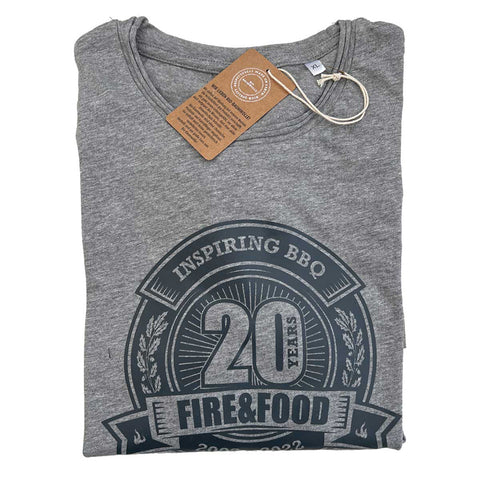Good beef makes you happy!
The Italian meat virtuoso and cult butcher Dario Cecchini ( www.dariocecchini.com ) has achieved international fame with his Antica Macelleria Cecchini in Panzano in Tuscany. In his butcher shop and restaurants, everything revolves around meat - and a rousing portion of good Italian hospitality.
View from Ponzano into the Tuscan hinterland
Italian cuisine has a reputation for always being best when it is simplest and most honest. Aside from pizza and pasta, families in each region have created their own specialties, passed on their knowledge from generation to generation, and thus given traditional Italian cuisine something thoroughly individual and lively. An authenticity that has managed to survive far away from the major tourist hot spots, such as in the middle of Tuscany. FIRE&FOOD is a guest in Panzano, a pretty town on the way between Siena and Florence, idyllically perched on a small hill in Chianti. Surrounded by vineyards, olive groves and forests, the Etruscans settled here and began breeding the famous Chianina cattle around 2300 years ago in the valley of the Chiana River, which also belongs to Tuscany. Panzano has had an important strategic significance in the military conflicts between Florence and Siena since the early Middle Ages and was expanded into a fortress. Although it was taken several times and partially destroyed, the castle “Castello di Panzano” with its main tower and parts of the ring wall still bear witness to this time.
The history of the “Antica Macelleria Cecchini” in Panzano does not go back quite as far. But this butcher's shop has managed to pass from father to son over eight generations in a good 250 years. Today the boss is Dario Cecchini, who did not really want to follow in his ancestors' footsteps forever. But life does not always turn out the way you imagine it. The focal point of Dario's childhood and youth was always the family-run butcher's shop, where everyone pitched in: his mother at the cash register, his father cutting up and processing the meat, and his grandmother day in, day out in the butcher's kitchen, where she prepared the family's daily meals. She managed to make something nutritious and tasty out of simple ingredients and every scrap of animal, and in doing so left a lasting impression on Dario's taste.
Nevertheless, Dario did not see his professional place in this butcher's shop. He preferred to travel with his father to the farmers to select the animals for later processing. This not only sharpened his eye for the strengths and weaknesses of each animal, but above all it awakened his love of animals and his desire to become a veterinarian. So he attended veterinary school in Pisa and then the agricultural school in Florence. But soon afterwards, after the early death of his mother, his father also became seriously ill. A deep blow for the whole family, especially financially. Dario was suddenly responsible for the family income. Instead of healing animals, he would now kill them. "The pressure that this task put on me was simply too great and the start was more than bumpy. I failed and was ashamed that I was not able to do justice to the family tradition. I have Orlando, my father's former assistant, to thank for saving the butcher's shop and thus myself. He became something like my teacher and made me aware that I can do justice to my love of animals in the butcher's trade: by showing the greatest possible respect to every animal that dies at my hands! This respect does not begin with the killing and subsequent processing, but rather with the birth of the animal and the conditions in which it is allowed to grow up. With every animal selected for the Antica Macelleria Cecchini, I also take responsibility for these factors," explains Dario Cecchini in our conversation.
The “altar” in the meat ripening room.
Near the village, Dario keeps a herd of Chianina horses.
When meat consumption becomes a cult
Processing an animal from snout to tail has been a matter of course for the butcher for over 45 years. Every day he tries to find the best cut and the best way of preparing each piece of meat and is almost missionary-like in his efforts to convince others of this view of the butcher's trade. His ancestors already processed the whole animal and his grandmother adopted this principle in her daily cooking, as all the better cuts of meat were intended for the customers and for the various meat and sausage creations. His grandmother's cuisine was simple but extremely creative and can still be experienced today in Dario's restaurant "Solociccia".
When images of staggering and falling cattle appeared in the media a good 20 years ago, the global appetite for beef came to a standstill - and around 1.5 million cattle were slaughtered and disposed of across the EU. The BSE crisis also reached Italy and thus Panzano, where Dario buried the famous "Bistecca Fiorentina" with a great spectacle, as the T-bone steak had mutated into a health risk. These images also went around the world, and when the last steaks were literally auctioned off for a good cause, numerous gourmets from Italy and abroad, including Elton John, took part in the auction - and made Dario Cecchini's butchery skills instantly famous.
Dario Cecchini is simply a person who has the gift of inspiring others with a lot of energy and pure joy of life. And if you have the opportunity to stop off in Panzano on a trip to Tuscany, you should definitely do it. With a bit of luck, you will meet the agile butcher in his "Antica Macelleria Cecchini", which is a place of revelation for meat fans. In addition to the Bistecca Fiorentina, also made in the style of Chianina beef, other delicious steak cuts are waiting to be selected and prepared in the pan or on the grill at home.
Typical regional specialties such as “Burro del Chianti” – the Chianti butter, which is made from lard with herbs instead of traditional butter – or “Tonno del Chianti” – a type of pickled suckling pig that tastes like tuna – are also worth discovering.
Anyone who doesn't want to grab the grill tongs themselves and was smart enough to reserve one of the coveted places in Dario's restaurants before their vacation can look forward to a very meat-focused dining experience. In addition to the traditional dishes from the butcher's kitchen of his childhood in the "Solociccia", the "Officina della Bistecca" focuses on all variations of steak, prepared on the charcoal grill and seasoned with just a little homemade herb salt and olive oil. "I was 18 years old when my father ceremoniously served me my first real steak. I had been looking forward to this moment for a long time, but was visibly disappointed after the first bite. It tasted good, yes, but the steak was not comparable to the aromatic variety that my grandmother used to bring to the table every day," Dario explains. But over the years his taste matured and his judgment grew, which can be seen in the celebrated steak culture of the "Officina della Bistecca". Here, the various meat courses are crowned with a Bistecca alla Fiorentina – however, the meat from Chianina beef is not used in these boozy feasts (the serving of house wine is also part of it).
The “altar” in the meat ripening room
For his meat dishes, Dario prefers cattle from Spanish breeders, with whom he has worked for decades. "The breed of cattle is not so important to me. I am more concerned with what the cattle have been fed and how they were allowed to grow up," explains the Tuscan butcher. "The bistecca must have a nice layer of fat and can be up to six centimeters thick. I grill it in the traditional way, on each side for eight minutes over direct heat. That way it is crispy on the outside and raw on the inside, and that is how it unfolds its full range of flavors," Dario is convinced. His four restaurants are part of event or experience gastronomy in the best sense of the word. Dario and his team want to convey the fun and enjoyment of eating - and not to forget the appreciation of the whole animal. Does that always work? Hard to say. We felt warmly welcomed that evening and the concept of gathering strangers from different countries around a large table and feeding them with a lot of fanfare appealed to us very much. Anyone who likes meat, has no problem eating what is served and is open to improvisation and an exuberant temperament will certainly get their money's worth here. Fine dining expectations are out of place, and if you come to this place with vegetarians, we would recommend a visit to Dario's butcher shop. There are vegetarian options in the restaurants, but this is a bit of a break in style... But a visit to Dario Cecchini is definitely an experience!





















